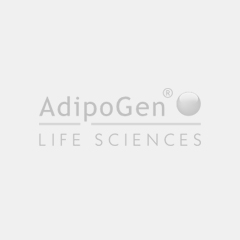IL-38 (human) (rec.) (His)
| Code | Size | Price |
|---|
| AG-40A-0191Y-C010 | 10 ug | £210.00 |
Quantity:
| AG-40A-0191Y-3010 | 3 x 10 ug | £410.00 |
Quantity:
Prices exclude any Taxes / VAT
Overview
Host Type: E.coli
Regulatory Status: RUO
Shipping:
Blue ice
Storage:
Short term: +4°C, Long term: -20°C.
Images
Documents
Further Information
Alternate Names/Synonyms:
Interleukin-38; Interleukin-1 Family Member 10 theta; IL-1F10; FIL1 theta; FKSG75; IL-1HY2; IL1-theta; Interleukin-1 HY2; Interleukin-1 Receptor Antagonist FKSG75
Concentration:
After reconstitution:for 10ug size: 0.1mg/ml
EClass:
32160000
Endotoxin:
<1EU/ug purified protein (LAL test; Lonza).
Form (Short):
solid
Formulation:
Lyophilized. In 50mM TRIS-Cl, pH 8.0, containing 150mM NaCl.
Handling Advice:
Avoid freeze/thaw cycles. Centrifuge lyophilized vial before opening and reconstitution.
Long Description:
Recombinant protein. Human IL-38 (aa 1-152) is fused at the C-terminus to a His-tag. Source: E. coli. Lyophilized. In 50mM TRIS-Cl, pH 8.0, containing 150mM NaCl. IL-38 (IL-1F10) mRNA is expressed in heart, placenta, fetal liver, spleen, thymus and tonsil. The expression in a variety of immune tissues and similarity to IL-1Ra suggest a role of IL-1F10 in the inflammatory response. It has been reported that removal of the N-terminus domain of the interleukins of the IL-1F family such as IL-1F5 / 6 / 8 or 9 (also called IL-36Ra, IL-36alpha, IL-36beta or IL-36gamma) is important to increase their biological activity. Recently it has been shown that IL-38 is N-terminally processed and secreted by apoptotic cells. Released processed IL-38 (20-152) binds to the receptor Interleukin-1 receptor accessory protein-like 1 (IL1RAPL1; TIGIRR-2) at the surface of macrophages. Processed IL-38-activated IL1RAPL1 reduces the production of IL-6 leading to inflammation attenuation.
Molecular Weight:
~18kDa (SDS-PAGE)
NCBI, Uniprot Number:
Q8WWZ1
Other Data:
UniProt link Q8WWZ1: IL-38 (human) http://www.uniprot.org/uniprot/Q8WWZ1
Package Type:
Plastic Vial
Product Description:
IL-38 (IL-1F10) mRNA is expressed in heart, placenta, fetal liver, spleen, thymus and tonsil. The expression in a variety of immune tissues and similarity to IL-1Ra suggest a role of IL-1F10 in the inflammatory response. It has been reported that removal of the N-terminus domain of the interleukins of the IL-1F family such as IL-1F5 / 6 / 8 or 9 (also called IL-36Ra, IL-36alpha, IL-36beta or IL-36gamma) is important to increase their biological activity. Recently it has been shown that IL-38 is N-terminally processed and secreted by apoptotic cells. Released processed IL-38 (20-152) binds to the receptor Interleukin-1 receptor accessory protein-like 1 (IL1RAPL1; TIGIRR-2) at the surface of macrophages. Processed IL-38-activated IL1RAPL1 reduces the production of IL-6 leading to inflammation attenuation.
Purity:
>95% (SDS-PAGE)
Sequence:
Human IL-38 (aa 1-152) is fused at the C-terminus to a His-tag.
Source / Host:
E. coli
TAGs:
His
Transportation:
Non-hazardous
UNSPSC Number:
41116127
Use & Stability:
Stable for at least 6 months after receipt when stored at -20°C.Working aliquots are stable for up to 3 months when stored at -20°C.After reconstitution, prepare aliquots and store at -20°C.
References
Interleukin-38 is released from apoptotic cells to limit inflammatory macrophage responses: J. Mora, et al.; J. Mol. Cell Biol. 8, 426 (2016) | Interleukin-38 interacts with destrin/actin-depolymerizing factor in human keratinocytes: D. Talabot-Ayer, et al.; PLoS One 14, e0225782 (2019) | Anti-inflammatory mechanisms of the novel cytokine interleukin-38 in allergic asthma: X. Sun, et al.; Cell Mol. Immunol. 17, 631 (2020) | Elevated IL-38 inhibits IL-23R expression and IL-17A production in thyroid-associated ophthalmopathy: Y. Pan, et al.; Int. Immunopharmacol. 91, 107300 (2021) | Multifaceted roles of IL-38 in inflammation and cancer: A. Diaz-Barreiro, et al.; Cytokine 151, 155808 (2022) | IL-38 blockade induces anti-tumor immunity by abrogating tumor-mediated suppression of early immune activation: J.P. Dowling, et al.; MABS 15, 2212673 (2023)



